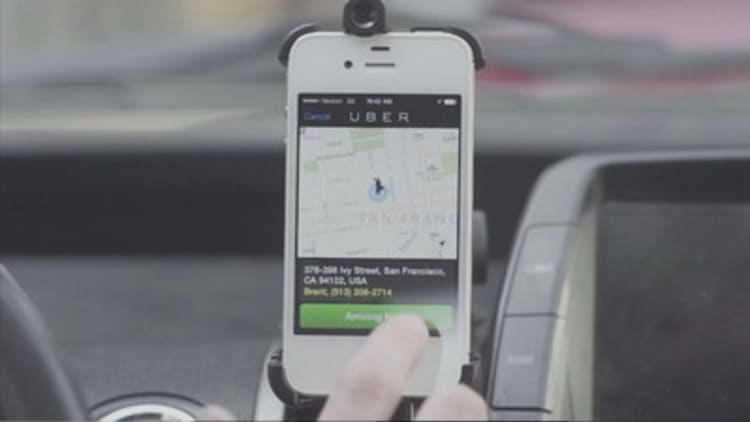
The sharing economy has already turned consumers' lives upside down. Now those trendy habits have spread to business travelers, according to a new study.
Uber accounted for 41 percent of ground transportation that workers expensed to their employers in the fourth quarter of last year, according to Certify. The online travel and expense management company aggregated 9 million receipts and expenses, and found Uber beats out car rentals, which declined to 39 percent of rides, and taxis, now just a fifth of ground transportation charges.
And Uber's market share appears to be on the rise: In the first quarter of 2015, all three types were around a third of ground transportation expenses tracked by Certify. As it turns out, the ride-hailing company has paved the way for other start-ups to make their way onto companies' lists of approved vendors, in what Certify calls a "pivotal year of change in business travel."
"Its really incredible that ride hailing services are getting huge growth but also the satisfaction [ratings from users]," said Bob Neveu, Certify's president. "If it was just because it was cheaper, there may not be staying power there. But this tells you that the rental industry better pay attention. There is disruption happening."
Uber rates an average of 4.46 out of five stars in Certify's data, compared with 4.01 for car rentals and 3.68 for taxis. It's a change that Neveau attributes to the "frictionless" model of ride-hailing apps, which are consistent and free busy travelers from inconveniences like receipts and haggling.
After seeing Uber rise to dominance in 2015's third quarter, Certify decided to track other sharing economy services, and found they were also seeing meteoric increases in business use. While use of Ubers increased 417 percent during the year, competitor Lyft saw a 712 percent increase in expensed transactions. Use of Airbnb grew 259 percent, and co-working space WeWork jumped 900 percent in the reports.
To be sure, none of these companies had near the market share of Uber, at least, not yet.
Indeed, some parts of business travel — like food — have proven more difficult to disrupt. While start-ups like DoorDash have seen triple-digit increases overall, Starbucks remains the most-expensed restaurant (and has been almost every quarter that Certify has tracked). Hotels like Marriott and Hampton Inn continue to be the most popular for business trips, particularly those that are short and involve lone travelers, for instance.
But because some companies, like HomeAway, funnel transactions through individuals rather than a centralized merchant of record, they may be gaining ground faster than Certify can measure, Neveu said.
"Their challenge is that they don't control the end product as much as Uber and Lyft do," Neveu said. "The bed, clean towels — there are a lot more barriers. It will continue to be successful, but they need to get a defined level of business class service."
Correction: An earlier version misspelled Neveu in two references.





